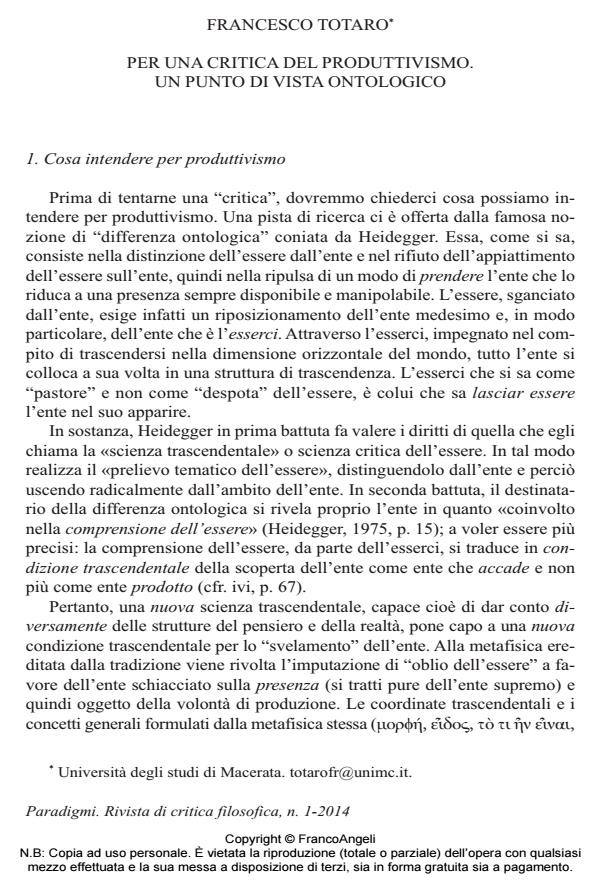A Contribution to the Critique of Productivism. An Ontological Outlook
Journal title PARADIGMI
Author/s Francesco Totaro
Publishing Year 2014 Issue 2014/1
Language Italian Pages 18 P. 19-36 File size 532 KB
DOI 10.3280/PARA2014-001002
DOI is like a bar code for intellectual property: to have more infomation
click here
Below, you can see the article first page
If you want to buy this article in PDF format, you can do it, following the instructions to buy download credits

FrancoAngeli is member of Publishers International Linking Association, Inc (PILA), a not-for-profit association which run the CrossRef service enabling links to and from online scholarly content.
In this paper, the critique does not concern the production in itself, but its hypertrophic enlargement, that we can call "productivism". It consists in reducing the whole reality to an object of production, and in forcing to increase the quantities, giving sense only to that we can use as means to produce. To illustrate the issue, the author refers to Aristotle, Heidegger and Marx, in order to ask this crucial question: how to preserve the totality of being from a destiny of unlimited manipulation? We have to save the difference between "production" and "generation"; so re-thinking the relationship between the happening being and the unconditioned being, which nobody could be able to produce.
Keywords: Production, productivism, Aristotle, Heidegger, generation, conditioned and unconditioned being.
- Anders G. (1980). Die Antiquiertheit des Menschen, Bd. II. München: C. H. Beck (trad. it.: L’uomo è antiquato. II. Sulla distruzione della vita nell’epoca della terza rivoluzione industriale. Torino: Bollati Boringhieri, 2007). Aristotele. Politica. Roma-Bari: Laterza, 1973.
- Dilthey W. (1883). Einleitung in die Geisteswissenschaften. In: Gesammelte Schriften , vol. I. Göttingen: Vandenhoeck & Ruprecht-Stuttgart: Teubner, 1966 (trad. it.: Introduzione alle scienze dello spirito. Firenze: La Nuova Italia, 1974).
- Edelman G.M. (2006). Second Nature. Brain Science and Human Knowledge. New Haven: Yale University Press (trad. it.: Seconda natura. Scienza del cervello e conoscenza umana. Torino: Raffaello Cortina, 2007).
- Fanciullacci R. (2012). La misura del vero. Un confronto con l’epistemologia contemporanea sulla natura del sapere e la pretesa di verità. Napoli: Orthotes.
- Fimiani M., Gessa Kuroschka V. e Pulcini E., a cura di (2004). Umano post-umano. Potere, sapere, etica nell’età globale. Roma: Editori Riuniti.
- Gadamer H.-G. (1986). Wahrheit und Methode (trad. it.: Verità e metodo. Milano: Bompiani, 2000).
- Grassi P. e Aguti A., a cura di (2008). La natura dell’uomo. Neuroscienze e filosofia a confronto. Milano: Vita e Pensiero.
- Heidegger M. (1929). Vom Wesen des Grundes. Halle an der Saale: Niemeyer (trad. it.: Dell’essenza del fondamento. In: Heidegger M.: Segnavia. Milano: Adelphi, 1987: 79-131).
- Heidegger M. (1975). Die Grundprobleme der Phänomenologie. Frankfurt a.M.: Klostermann (trad. it.: I problemi fondamentali della fenomenologia. Genova: il melangolo, 1990).
- Ladrière J. (2000). Sur le rôle de l’idée de nature en éthique. In: Bateman-Novaes S., Ogien R. e Faro P., éds. Raison pratique et sociologie de l’éthique. Paris: CNRS Édition.
- Latouche S. (2005). Come sopravvivere allo sviluppo. Milano: Bollati Boringhieri. Latouche S. (2006). Le pari de la décroissance. Paris: Fayard (trad. it.: La scommessa della decrescita. Milano: Feltrinelli, 2007).
- Mannheim K. (1929). Ideology and Utopia. London: Routledge and Kegan. 1953 (trad. it.: Ideologia e utopia. Bologna: il Mulino, 1965).
- Mounier E. (1949). La petite peur du XX siècle. Paris: Éditions du Seuil (trad. it.: La paura dell’artificiale. Progresso, catastrofe, angoscia. Troina: Città Aperta, 2007).
- Negri A. (1986). I tripodi di Efesto. Civiltà tecnologica e liberazione dell’uomo. Milano: Sugarco Edizioni.
- Oliverio A. (2004). Mito e realtà delle neuroscienze. In: Fimiani M., Gessa Kuroschka V. e Pulcini E., a cura di. Umano post-umano. Potere, sapere, etica nell’età globale. Roma: Editori Riuniti, 2004: 137-156.
- Pöggeler O. (1963). Der Denkweg Martin Heideggers. Pfullingen: Neske (trad. it.: Il cammino di pensiero di Martin Heidegger. Napoli: Guida, 1991). Spaemann R. (2008). ‘Naturale’ e ‘innaturale’ sono concetti moralmente rilevanti?.
- In: Vigna C. e Zanardo S., a cura di. Etica di frontiera. Nuove forme del bene e del male. Milano: Vita e Pensiero: 85-98.
- Tagliagambe S. (2004). Mente e cervello. Un rapporto problematico. In: Fimiani M., Gessa Kuroschka V. e Pulcini E., a cura di. Umano post-umano. Potere, sapere, etica nell’età globale. Roma: Editori Riuniti, 2004: 157-194.
- Totaro F. (2008). Persona e lavoro oggi. Paradigmi, XXIV, 67: 101-120.
- Totaro F. (2013). Assoluto e relativo. L’essere e il suo accadere per noi. Milano: Vita e Pensiero.
- Tundo Ferente L., a cura di (2006). Etica della vita: le nuove frontiere. Bari: Dedalo.
- Tyemieniecka A.-T. (2009). The Fullnes of the Logos in the Key of Life. Book I. The case of God in the New Enlightement. Dordrecht: Springer.
- Verducci D. (2009). Anna-Teresa Tymieniecka: fenomenologa della vita e personalista?. In: Pavan A., a cura di. Enciclopedia della persona nel XX secolo. Napoli:
- ESI: 1061-1066.
- Verducci D. (2001). Anna-Teresa Tymieniecka. La trama vivente dell’essere. In: Ales Bello A. e Brezzi F., a cura di. Il filo(sofare) di Arianna. Percorsi del pensiero femminile nel Novecento. Milano: Mimesis: 63-89.
- Vigna C. e Zanardo S., a cura di (2008). Etica di frontiera. Nuove forme del bene e del male. Milano: Vita e Pensiero.
Francesco Totaro, Per una critica del produttivismo. Un punto di vista ontologico in "PARADIGMI" 1/2014, pp 19-36, DOI: 10.3280/PARA2014-001002